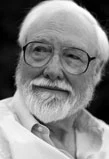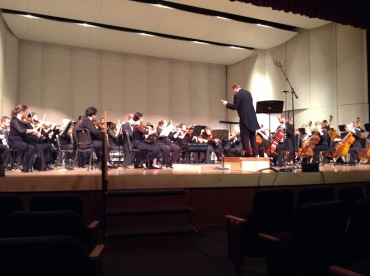The Well-Tempered Ear
Classical music: The Middleton Community Orchestra, with solo violinist Paran Amirinazari, closes its seventh season with rousing and intense performances of Prokofiev and Tchaikovsky
Leave a Comment
By Jacob Stockinger
Here is a special posting, a review written by frequent guest critic and writer for this blog, John W. Barker. Barker (below) is an emeritus professor of Medieval history at the University of Wisconsin-Madison. He also is a well-known classical music critic who writes for Isthmus and the American Record Guide, and who hosts an early music show once a month on Sunday morning on WORT FM 89.9 FM. For years, he served on the Board of Advisors for the Madison Early Music Festival and frequently gives pre-concert lectures in Madison.
By John W. Barker
On Wednesday night, the Middleton Community Orchestra (below) closed its seventh season with a rousing program offering three contrasting Russian works.
The opener was the Overture to Alexander Borodin’s Prince Igor, as realized by Alexander Glazunov. It served to show off the orchestra’s ever-developing string band, solid in tone, if still lacking a little in warmth.
A real gem was the second work, the Violin Concerto No. 2 by Sergei Prokofiev. By contrast with the composer’s first venture in that form — a taut, aggressive affair — this one is more relaxed and jovial, if no less demanding technically.
The soloist was Paran Amirinazari (below), stepping out of her usual concertmaster’s slot into the full spotlight. She handled admirably the great technical demands of her solo role, full of quirky and tricky writing.
But, amid all the spikiness she pointed up handsomely the real and almost neo-Romantic lyrical sweetness that Prokofiev infused into the showiness. (Just listen to the gorgeous second movement in the YouTube video at the bottom.)
This is one of the truly great violin concertos, and Amirinazari — the brilliant artistic director of the fabulous Willy Street Chamber Players — demonstrated that adroitly.
The final work was a grand effort: Tchaikovsky’s Symphony No. 5. This is, of course, one of those “warhorses” about which The Ear has been debating lately. It is thereby the more challenging for an orchestra to present to an audience likely to be familiar with it.
Its calculated lavishness has made it a masterpiece beloved by the public, but it is still fascinating to encounter with close listening. The composer pulled out all his tricks of dazzling orchestration and melodic invention, but in the service of a grand-scaled structure that skillfully manipulates cyclical and cross-referential transformation of themes through the score’s totality.
Maestro Steve Kurr (below) by now has nurtured remarkably solid resources for an orchestra of this kind. The potent brass choir is really well consolidated, backing fine-sounding woodwinds. Kurr made the most of these resources, in a well-rehearsed performance in which the stress on intensity of playing resulted in highly dramatic results, culminating in a truly noble ending.
This was a richly satisfying program, showcasing an ensemble of which Middleton should be button-burstingly proud.
Tags: American Record Guide, Artistic director, Arts, band, Borodin, brass, Cello, Chamber music, Classical music, concertmaster, critic, Early music, emeritus, ending, ensemble, gem, Glazunov, History, invention, Isthmus, Jacob Stockinger, John W. Barker, lecture, lyrical, lyricism, Madison, Madison Early Music Festival, Madison Symphony Orchestra, Maestro, masterpiece, Medieval, melody, Middleton, Middleton Community Orchestra, movement, Music, nobel, Orchestra, orchestration, Overture, Paran Amarinazari, Prince Igor, professor, program, Prokofiev, Pyotr Ilyich Tchaikovsky, relaxed, Romantic, Russia, Russian, solo, Steve Kurr, strings, structure, sweet, sweetness, symphony, tone, United States, University of Wisconsin-Madison School of Music, University of Wisconsin–Madison, Violin, war horse, warhorse, warmth, Willy Street Chamber Players, Wisconsin, woodwinds, WORT-FM 89.9, YouTube
- May 2024
- April 2024
- March 2024
- February 2024
- January 2024
- December 2023
- November 2023
- October 2023
- September 2023
- August 2023
- July 2023
- June 2023
- May 2023
- April 2023
- March 2023
- February 2023
- January 2023
- December 2022
- October 2022
- September 2022
- June 2022
- May 2022
- April 2022
- March 2022
- July 2021
- June 2021
- May 2021
- April 2021
- March 2021
- February 2021
- January 2021
- December 2020
- November 2020
- October 2020
- September 2020
- August 2020
- July 2020
- June 2020
- May 2020
- April 2020
- March 2020
- February 2020
- January 2020
- December 2019
- November 2019
- October 2019
- September 2019
- August 2019
- July 2019
- June 2019
- May 2019
- April 2019
- March 2019
- February 2019
- January 2019
- December 2018
- November 2018
- October 2018
- September 2018
- August 2018
- July 2018
- June 2018
- May 2018
- April 2018
- March 2018
- February 2018
- January 2018
- December 2017
- November 2017
- October 2017
- September 2017
- August 2017
- July 2017
- June 2017
- May 2017
- April 2017
- March 2017
- February 2017
- January 2017
- December 2016
- November 2016
- October 2016
- September 2016
- August 2016
- July 2016
- June 2016
- May 2016
- April 2016
- March 2016
- February 2016
- January 2016
- December 2015
- November 2015
- October 2015
- September 2015
- August 2015
- July 2015
- June 2015
- May 2015
- April 2015
- March 2015
- February 2015
- January 2015
- December 2014
- November 2014
- October 2014
- September 2014
- August 2014
- July 2014
- June 2014
- May 2014
- April 2014
- March 2014
- February 2014
- January 2014
- December 2013
- November 2013
- October 2013
- September 2013
- August 2013
- July 2013
- June 2013
- May 2013
- April 2013
- March 2013
- February 2013
- January 2013
- December 2012
- November 2012
- October 2012
- September 2012
- August 2012
- July 2012
- June 2012
- May 2012
- April 2012
- March 2012
- February 2012
- January 2012
- December 2011
- November 2011
- October 2011
- September 2011
- August 2011
- July 2011
- June 2011
- May 2011
- April 2011
- March 2011
- February 2011
- January 2011
- December 2010
- November 2010
- October 2010
- September 2010
- August 2010
- July 2010
- June 2010
- May 2010
- April 2010
- March 2010
- February 2010
- January 2010
- December 2009
- November 2009
- October 2009
- September 2009
- August 2009
Archives
- 2,491,381 hits
Blog Stats
Recent Comments
| Brian Jefferies on Classical music: A major reass… | |
| welltemperedear on What made Beethoven sick and… | |
| rlhess5d5b7e5dff on What made Beethoven sick and… | |
| welltemperedear on Beethoven’s Ninth turns 200… | |
| Robert Graebner on Beethoven’s Ninth turns 200… |
Tags
#BlogPost #BlogPosting #ChamberMusic #FacebookPost #FacebookPosting #MeadWitterSchoolofMusic #TheEar #UniversityofWisconsin-Madison #YouTubevideo Arts audience Bach Baroque Beethoven blog Cello Chamber music choral music Classical music Compact Disc composer Concert concerto conductor Early music Facebook forward Franz Schubert George Frideric Handel Jacob Stockinger Johannes Brahms Johann Sebastian Bach John DeMain like link Ludwig van Beethoven Madison Madison Opera Madison Symphony Orchestra Mead Witter School of Music Mozart Music New Music New York City NPR opera Orchestra Overture Center performer Pianist Piano post posting program share singer Sonata song soprano String quartet Student symphony tag The Ear United States University of Wisconsin-Madison School of Music University of Wisconsin–Madison Viola Violin vocal music Wisconsin Wisconsin Chamber Orchestra wisconsin public radio Wolfgang Amadeus Mozart YouTube


